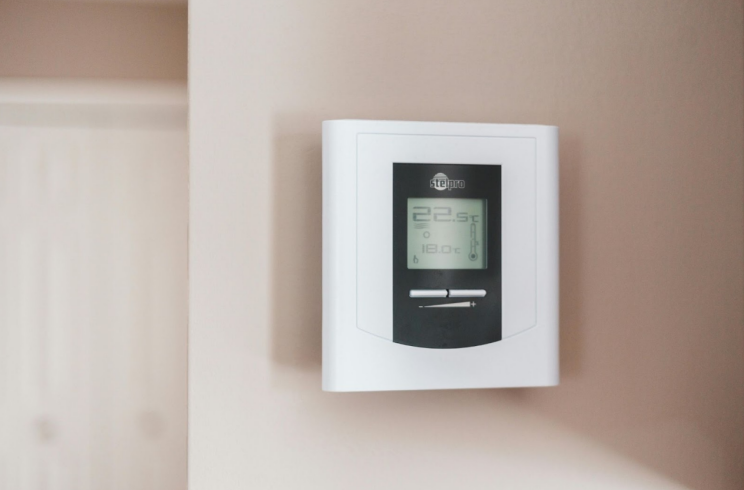The 21st-century domestic environment has changed into a smart and interconnected system. There is no other sector that is undergoing this change as much as the heating and cooling systems. Smart home heating and cooling are transforming human relations with climate control that may usher in an era of automation, efficiency, and personalization.
Whether homeowners will use smart climate systems or not is one question, but what is left is how soon this technology will introduce new standards of comfort and sustainability to Bay Area HVAC services.

The Evolution of Home Climate Control
The initial generation of programmable thermostats provided an idea of a shift with the ability of homeowners to pre-program temperatures for a time or a day. However, these primitive systems were user disciplined and had to be updated frequently in order to be effective.
Next was the Internet of Things (IoT), an innovation that brought common household items into the network with the ability to learn and optimize itself in real-time. The heating and cooling systems could now think and react to the usage patterns, weather forecasts, and even occupancy data. The outcome was a massive jump: the houses that not only ensure an ideal level of comfort, but also do it smartly and are environmentally friendly.
The Smart Home Difference
Interconnectivity and automation are the characteristics of smart homes that make them different from traditional systems. Smart thermostats, variable speed HVAC, and zone temperature sensors are sentient and interactive in order to provide comfort in the right place and at the right time.
Major distinction factors are:
- Adaptive learning
- Remote access
- Smart climate control
- Data-driven insights
As an illustration, an automatic turning down of heating or cooling can be achieved when the smart hub in the home realizes that it has no occupant, which conserves energy.
Efficiency and Sustainability in Focus
It is not that smart home heating and cooling systems are only a matter of convenience, but rather a pillar of modern sustainability endeavors. Energy efficiency has now become a personal/environmental concern, and smart homes are at the forefront.
Homeowners can save up to 20% per year on heating and cooling by allowing a smart thermostat to manage the temperature. These savings are attractive as owners of houses increasingly become more aware of their carbon footprint and the increase in utility bills.
The Smart HVAC systems make the systems sustainable in the following ways:
- Dynamic energy optimization
- Solar or geothermal integration
- Less maintenance waste
- Adherence to efficiency requirements
Other companies, such as Chill Heating and Cooling, are assisting homeowners to eliminate the divide between the traditional HVAC and a smart system, providing installations that combine comfort with the latest sustainability. With the development of energy-efficient technologies, these home automation HVAC systems will form the basis of the net-zero energy homes.

Personalized Comfort and Convenience
The possibility to adjust the comfort to personal mentality is one of the most attractive features of smart heating and cooling. Gone are the days of temperature control, which is one-size-fits-all. The systems in the present day also have climate control in the form of zones, where each of the rooms or areas has its optimal temperature.
The most outstanding personalization features are:
- Room-by-room temperature zoning
- Smart integrations with wearable technology
- Voice/AI assistants IV Voice commands or routines
- Predictive comfort algorithms
Such home automation HVAC customization not only increases comfort, but it also redefines the experience of living in the areas that residents place it in, as the climate control becomes automatic and easy.
Emerging Standards and Industry Expectations
The HVAC industry is responding to the new smart home technology that is being rapidly adopted. Manufacturers, contractors, and regulators are setting new standards to ensure there is performance, compatibility, and safety of data.
These are some of the emerging expectations:
- HVAC systems are expected to be able to interplay between the platforms (Google Home, Apple HomeKit, Amazon Alexa, etc.) to provide a one-stop experience to the user.
- Cybersecurity controls- As the systems are being integrated into the internet, the user information should be secured, and unwarranted access has to be blocked too.
- Energy reporting and benchmarking - Smarter systems are increasingly becoming automated in energy reporting, allowing homeowners to survey the usage of energy and the compliance with green standards.
- Government and energy commissions put in place regulatory frameworks to provide guidelines on connected device efficiency, which should be incentivized with smart installation.
Such standards are changing the way the industry designs, installs, and maintains the cooling and heating systems. Smart technology is no longer an option; it is becoming the standard of a modern home infrastructure.
Challenges and Considerations
There is no such thing as the emergence of smart thermostat systems without challenges.
- Initial expenditure
- Compatibility problems
- Privacy of data
- Dependence on technology
The majority of the issues might be mitigated through the choice of competent installers and systems that may be updated to address the changes in the future.
The concept of heating and cooling is being refigured by smart home technology. The capability to control comfort intelligently, to optimize energy consumption, and to be in line with sustainability targets is a revolutionary change in the way people live at home.
To facility managers, homeowners, and builders, there is no mistaking the message: investing in smart heating and cooling systems now only equates to keeping in line with the homes and standards of the future.











(0) comments
We welcome your comments
Log In
Post a comment as Guest
Keep it Clean. Please avoid obscene, vulgar, lewd, racist or sexually-oriented language.
PLEASE TURN OFF YOUR CAPS LOCK.
Don't Threaten. Threats of harming another person will not be tolerated.
Be Truthful. Don't knowingly lie about anyone or anything.
Be Nice. No racism, sexism or any sort of -ism that is degrading to another person.
Be Proactive. Use the 'Report' link on each comment to let us know of abusive posts.
Share with Us. We'd love to hear eyewitness accounts, the history behind an article.